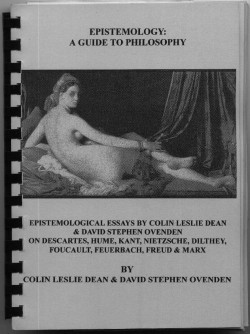
Epistemological presuppositions guide and limit the philosophical outcome of philosophers’ philosophies. In this regard epistemology becomes a guide to a philosopher’s philosophy. Philosophers’ epistemology’s make it possible to think only certain things. The epistemology structures thinking such that only certain inferences are possible. In this regard epistemology is ethical because it tells us what we should or should not believe. Like religions such as Christianity or Buddhism, with it’s myriad of schisms, philosophy has it’s own epistemological schisms. Each epistemological schism becomes a form of ethical dogmatism in that it puts its self forward as the only way to view and thus act upon the world. Descartes, … and the more modern philosophers such as Wittgenstein, … become Fascist in the sense that they argue dogmatically that their epistemology leads them to put forward the correct guide …
| Title | Epistemology: a guide to philosophy (epistemological essays by Colin Dean and David Ovenden on Descartes, Hume, Kant, Nietzsche, Dilthey, Foucault, Feuerbach, Freud and Marx) |
| Author | Dean, Colin Leslie & Ovenden, David Stephen |
| Published | Gamahucher Press, West Geelong, Vic, 1997 |
| Description | 107 |
| Bibliography | Includes bibliographical references |
| Subject | Theory of Knowledge, Philosophy |
| ISBN | 1876347031 |
| Download |
![]()

